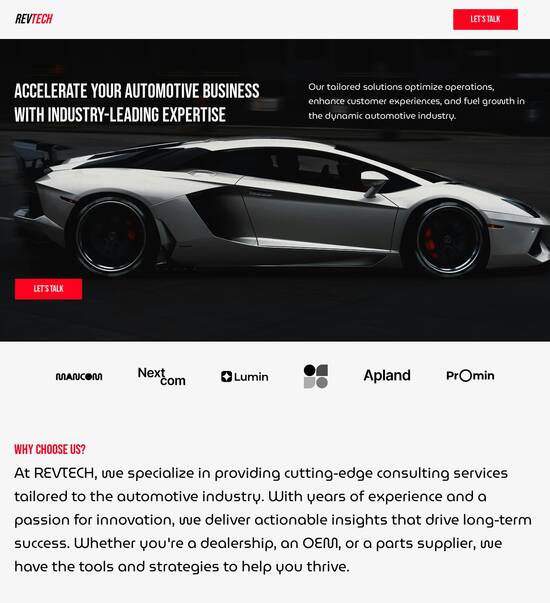
Next.js optimized pre-order page template
Explore Similar TemplatesAbout template
Supercharge your pre-order page with Next.js for outstanding performance! Learn more today.
Recommended templates

Easy to build without coding
With the intuitive drag-and-drop builder, anyone on your team can create high-converting pages without any knowledge of code or design. Make enhancements to your landing page with custom widgets using Javascript, HTML/CSS, or third-party scripts.

Multiple layouts for any industry and goal
Select from 500+ landing page layouts built to boost conversions across industry-specific scenarios. Customize them by adjusting fonts, adding images, and generating on-brand content with the AI assistant. Quickly scale with Instablocks® and Global Blocks that you can save, reuse, and update globally.

Loads fast and looks polished on any device
Every template is responsive, which means they present professionally on any device and load blazingly fast with our Thor Render Engine. You can also power them up with Google AMP technology to deliver an unparalleled mobile experience and drive higher conversions.

Robust analytics & experimentation
Get real-time updates and reporting across all your devices, showing the number of visitors, conversions, cost-per-visitor, and cost-per-lead. Launch AI-powered experiments, run A/B tests, and use heatmaps to analyze user behavior, then optimize your landing page to maximize conversions.







Easy to build without coding
With the intuitive drag-and-drop builder, anyone on your team can create high-converting pages without any knowledge of code or design. Make enhancements to your landing page with custom widgets using Javascript, HTML/CSS, or third-party scripts.
Multiple layouts for any industry and goal
Select from 500+ landing page layouts built to boost conversions across industry-specific scenarios. Customize them by adjusting fonts, adding images, and generating on-brand content with the AI assistant. Quickly scale with Instablocks® and Global Blocks that you can save, reuse, and update globally.
Loads fast and looks polished on any device
Every template is responsive, which means they present professionally on any device and load blazingly fast with our Thor Render Engine.
Robust analytics & experimentation
Get real-time updates and reporting across all your devices, showing the number of visitors, conversions, cost-per-visitor, and cost-per-lead. Launch AI-powered experiments, run A/B tests, and use heatmaps to analyze user behavior, then optimize your landing page to maximize conversions.
All the features you need to build lead-generating landing pages
Explore more featuresLearn how to build top-performing landing pages for any goal
FAQs
Leading the way in building high-performing landing pages





The ultimate guide to creating a high-converting landing page
To maximize return on investment in your digital marketing campaigns, understanding how to create high-converting landing pages is essential. Instapage stands out as the premier platform for marketers looking to accelerate and optimize their campaigns through effective conversion rate optimization (CRO) practices. This guide will walk you through a step-by-step approach for creating landing pages that not only draw attention but also convert visitors into leads.
Step 1: Selecting the right template
Choosing a high-converting landing page template is crucial. Instapage offers over 100 pre-built templates specifically designed for various industries, ensuring that you can start your campaign without any hassle. Look for templates that have proven conversion rates, as these are often optimized for user engagement and lead capture.
- Consider your target audience's preferences and behavior when selecting a template.
- Choose templates designed for mobile optimization to reach users on various devices.
- Ensure the template has clear calls-to-action that guide users towards completing the desired action.
Step 2: Using lead generation elements
Once you've selected a template, it's time to enhance it using lead generation elements. Instapage provides a vast library of customizable elements that make capturing leads effortless. Focus on adding forms, buttons, and other interactive elements that encourage user engagement.
- Implement forms with minimal fields to increase submission rates.
- Incorporate compelling call-to-action buttons that stand out visually.
- Use social proof through testimonials or user reviews to build trust.
Step 3: Optimizing for conversions
Optimization is key to maintaining high conversion rates. Utilize Instapage's built-in experimentation features like A/B testing to find which elements perform best. Monitor user behavior with detailed heatmaps to identify where visitors click and adjust your landing page accordingly.
- Conduct A/B tests on different headlines and calls-to-action to identify which resonates more with your audience.
- Analyze heatmaps to understand user behavior and optimize your layout for engagement.
- Regularly assess landing page performance through the analytics dashboard to fine-tune strategies.
By following these steps, you’ll create landing pages that not only captivate your audience but also efficiently convert them into customers. Instapage provides the tools and insights necessary to optimize your campaigns for better results.
Ultimately, creating high-converting landing pages involves strategic choices in design, content, and ongoing optimization. With Instapage, you can continuously refine your approach and maximize your marketing ROI.
Ready to transform your digital marketing efforts? Start creating stunning, high-converting landing pages today with Instapage!
People also ask about Next.js optimized pre-order page template
The evolution of e-commerce: Exploring Next.js optimized pre-order page templates
Understanding Next.js and its role in modern development
Next.js has emerged as a leading React framework, gaining prominence due to its versatility and advanced features. Designed for server-side rendering, static site generation, and API routes, Next.js caters to developers looking for an efficient way to build high-performance web applications. Its architectural model allows developers to create fast-loading pages that enhance user engagement and satisfaction.
The significance of performance optimization in e-commerce cannot be overstated. With the majority of online consumers expecting immediate responses, using a framework like Next.js that focuses on speed and efficiency gives businesses a competitive edge. Enhanced performance not only improves user experience but directly correlates with higher conversion rates and reduced bounce rates. This aspect is critical, especially for pre-order pages, where initial impressions and user trust play pivotal roles.
The importance of pre-order pages in e-commerce
Pre-order pages serve as a specialized approach within e-commerce, allowing businesses to offer products before they are available for general sale. These pages are more than just placeholders; they play a pivotal role in assessing market demand and gauging potential interest in new products. By implementing a pre-order model, businesses can secure revenue ahead of production and create anticipation among consumers.
Moreover, pre-order pages can drive sales and cultivate excitement around upcoming launches. They allow companies to build a marketing narrative around their products, encouraging customers to become engaged stakeholders in the process. Analytics indicate that effective pre-order strategies can significantly increase sales momentum, comparing sales figures before and after a product launch, showing that well-executed pre-order campaigns can yield impressive results.
Features of Next.js optimized pre-order page templates
Next.js optimized pre-order page templates come equipped with several benefits that enhance performance and usability. One key feature is server-side rendering (SSR), which allows pages to load swiftly, ensuring users have immediate access to vital information without delays. This fast loading time is crucial, as studies show that a mere second delay in page response can lead to significant user drop-off rates.
Client-side navigation is another hallmark feature, enabling smooth transitions between pages, which effectively enhances user experience. Furthermore, SEO optimization is integral to these templates. By employing best practices for on-page SEO with Next.js, businesses can ensure that their pre-order pages rank higher in search engine results, ultimately driving more traffic to their site. Additionally, metadata management within these templates helps in streamlining the optimization process, making it easier to implement various marketing strategies.
Fast loading times through server-side rendering (SSR)
Seamlessly navigates between pages enhances user experience
SEO optimization for better search visibility
Streamlined metadata management
Key components of an effective pre-order page template
Creating an effective pre-order page template involves multiple key components tailored to engage visitors effectively. The foundational elements include compelling visuals that align with excellent UX design principles, ensuring that users are drawn to the product and intrigued by the offering. A well-placed call-to-action (CTA) button is essential, as strategic placement and persuasive wording can significantly increase conversion rates.
Moreover, showcasing pertinent product information and availability is critical. This entails presenting product details in a clear and appealing manner while utilizing countdown timers and displaying stock levels to instill a sense of urgency among potential buyers. Trust signals such as reviews, ratings, and testimonials help reinforce consumer confidence. Highlighting security features and diverse payment options also contributes to building trust with users, thereby increasing the likelihood of successful conversions.
Compelling visuals aligned with UX design principles
Strategically placed and worded CTA buttons
Effective showcase of product details
Urgency created through countdown timers and stock levels
Inclusion of trust signals and secure payment options
Development process: Building your own pre-order page with Next.js
Embarking on the development of a pre-order page using Next.js begins with setting up your development environment. This process starts with the installation of Next.js and its necessary dependencies, ensuring that all foundational tools are in place. Selecting the right multipurpose SaaS theme tailored for your project can significantly influence customization and adaptability, allowing for a smoother development experience.
Once the environment is ready, you can proceed with customizing your template based on the chosen Next.js options. This is where you can add dynamic features like real-time stock updates and notifications, enhancing the interactivity of the page. Integration with backend services is the next critical step, allowing your admin template to connect to product APIs effectively. This ensures that managing orders and customer data is streamlined and efficient, paving the way for a professional and effective pre-order operation.
Install Next.js and necessary dependencies
Choose the appropriate multipurpose SaaS theme
Customize your template with dynamic features
Connect to product APIs for order management
Sourcing the right templates and documentation
Selecting the right pre-order page templates hinges on several best practices. First, evaluate the templates against your branding and product requirements, ensuring alignment in design and function. It’s equally vital to consider the level of customization they allow, as flexibility is essential for tailoring your page to meet specific marketing goals. Checking community resources and official documentation can also provide invaluable guidance, enhancing your development experience.
Moreover, utilizing existing templates can greatly foster innovation within your project. They not only save time but also accelerate the development process, allowing for rapid deployment of effective landing pages. Familiarizing yourself with the structure and features of these templates can inspire creative modifications that align better with unique branding or user engagement strategies.
Evaluate templates against branding and needs
Consider customization levels for flexibility
Leverage community resources and documentation
Utilize existing templates to accelerate development
Enhancing user experience through custom features
To refine pre-order pages continually, implementing A/B testing can prove invaluable. This method allows businesses to compare two versions of a page and assess which performs better, an essential practice for optimizing user engagement and boosting conversions. Using analytical tools provides insights into user behavior, allowing marketers to make data-driven decisions based on tracked engagement metrics.
Delivering personalized experiences significantly enhances the appeal of pre-order pages. Tailoring content dynamically to address the unique needs of distinct audience segments can markedly improve engagement rates. This level of customization not only satisfies consumers’ expectations but also elevates overall satisfaction, ultimately fostering long-term loyalty.
Implement A/B testing for page optimization
Use analytics to track user behavior and engagement
Deliver personalized content for improved experiences
Unique benefits of using Next.js optimized pre-order pages
Utilizing Next.js optimized pre-order pages presents various unique benefits that can impact a business significantly. The architecture and components of these pages often lead to increased conversion rates, as streamlined experiences eliminate common friction points that deter potential buyers. Overall performance improves, reducing cart abandonment, which is crucial in retaining revenue and customer interest.
Moreover, the use of Next.js enhances the development process, ensuring that the pages can be maintained efficiently in the long run. As the e-commerce landscape evolves, businesses are naturally inclined to adopt features that are forward-thinking and future-proof, ensuring their strategies remain viable and competitive going forward.
Increased conversion rates through improved usability
Reduced cart abandonment rates
Efficient maintenance of development processes
Future-proofed e-commerce strategies with advanced features
Case studies: Success stories with optimized pre-order templates
Examining success stories can provide concrete evidence of the effectiveness of Next.js optimized pre-order templates. For instance, a startup experienced a remarkable turnaround after implementing a pre-order strategy using Next.js. They saw their initial sales exceed expectations, showcasing the potential these pages can generate not just in revenue but as a promotional tool.
Additionally, a well-known brand was able to leverage their pre-order page to increase consumer engagement significantly, witnessing a boost in social interactions and brand loyalty as a result. These examples highlight the validity of investing in optimized templates, showcasing how businesses can harness modern technologies to stay ahead of the competition while adjusting to consumer demands.
Startup turnaround with exceeding initial sales expectations
Notable increase in consumer engagement for a well-known brand
Improved social interactions and brand loyalty as a result of effective pre-order strategies
Looking forward: The future of pre-ordering in e-commerce
As we look to the future of pre-ordering in e-commerce, emerging trends continue to shape the landscape. Innovations within user experience, such as augmented reality product displays and advanced personalization, are becoming more prevalent, allowing users to interact with products in ways previously thought unimaginable. The integration of AI tools for predictive analytics also holds the promise of tailoring pre-order experiences to individual user behaviors.
Additionally, advancements in template design that focus on responsiveness and accessibility ensure that sites can cater to diverse consumer bases globally. As e-commerce continues to evolve, refinements in the pre-order model will undoubtedly cater to shifting consumer expectations, promising exciting opportunities for businesses willing to adapt and innovate.
Emerging trends in product interaction, including augmented reality
Use of AI tools for predictive analytics in marketing
Focus on responsiveness and accessibility in template design
Continued evolution in pre-order models to meet consumer expectations
Ready to skyrocket conversions?
Supercharge your ad campaigns with high-performing landing pages
Get started














